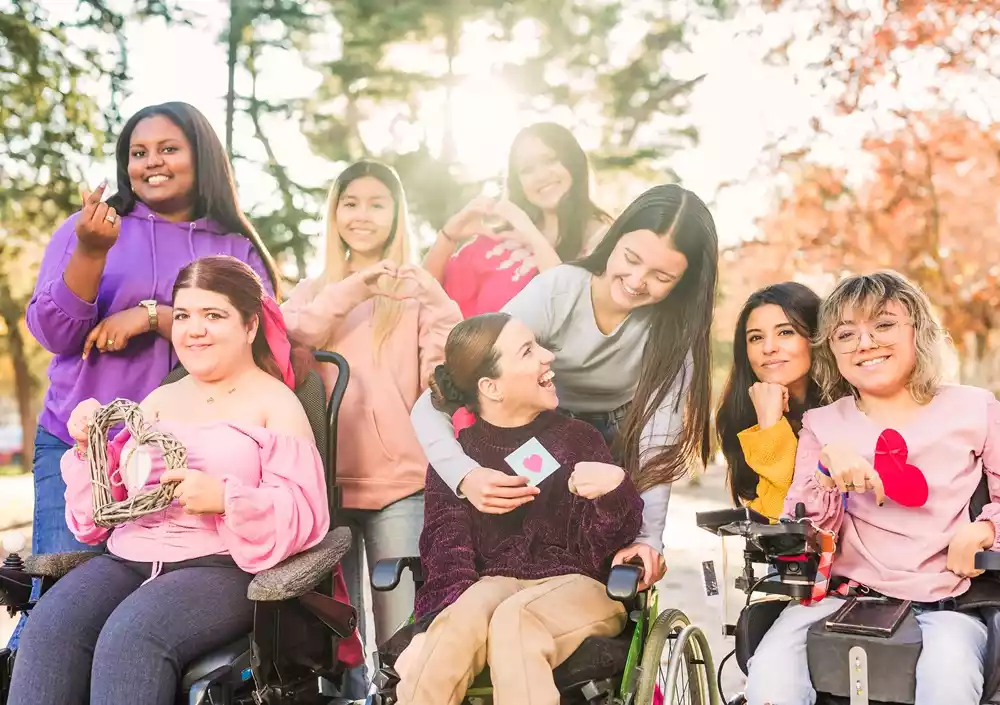Disability Support myths debunked: Facts vs fiction
Disability Support myths debunked: Facts vs fiction
Blog Article
The Vital Connection Between Impairment Providers and Effective Home Care Solutions
The relationship between special needs services and home care solutions is important for enhancing the lives of people with specials needs. Handicap services give crucial sources and assistance. Home care options use customized aid in acquainted atmospheres. This partnership promotes freedom and social addition. Yet, the specifics of how these components connect continue to be complex. Comprehending this link can disclose new insights right into enhancing look after those in need. What are the ramifications for caretakers and people alike?
Comprehending Impairment Providers: An Introduction
While many people might not fully comprehend the complexities of special needs services, comprehending their range and importance is crucial for cultivating inclusivity. Disability solutions encompass a variety of support devices developed to help people with physical, intellectual, or developmental impairments. These services aim to improve the top quality of life, advertising freedom and involvement in society. They consist of educational programs, work support, transportation support, and healthcare services customized to specific needs.Furthermore, these services usually entail partnership among different stakeholders, including government companies, charitable companies, and neighborhood groups. This collective strategy guarantees that people obtain extensive assistance that addresses their unique difficulties. Recognition of impairment services is important, as it motivates societal approval and the removal of stigma. By identifying the significance of these services, communities can develop an extra inclusive environment, ultimately benefiting everyone and advertising level playing fields for people with handicaps.
The Duty of Home Treatment in Supporting People With Disabilities
Home treatment plays a vital role in boosting the lives of individuals with impairments by supplying personalized support in familiar atmospheres. This sort of care permits individuals to keep their self-reliance while obtaining support customized to their particular demands. Caretakers not just offer physical assistance, such as assist with day-to-day activities like showering and dish prep work, however also give psychological encouragement and companionship.In enhancement to functional help, home care solutions facilitate social interaction, which is basic for mental health. By involving individuals in area activities or helping with interaction with friends and family, caregivers assist combat sensations of isolation. Home treatment also eases the worry on member of the family, allowing them to concentrate on their very own duties while guaranteeing their liked ones receive ample treatment (Disability Services Sydney). Inevitably, home care works as a substantial assistance system, empowering individuals with impairments to flourish within their own homes
Tailored Treatment Strategies: Satisfying Distinct Requirements
Customized treatment strategies are important for successfully addressing the distinct requirements of people with disabilities. These strategies are made to offer personalized assistance, thinking about the particular obstacles and preferences of each person. By performing complete analyses, treatment suppliers can recognize staminas and areas calling for support, guaranteeing that care is both pertinent and effective.Incorporating input from the specific and their family participants promotes a joint approach, boosting engagement and complete satisfaction. Customized care plans might include different solutions, such as physical therapy, work therapy, and individual care assistance, all focused on promoting total wellness. Regular examinations of these treatment strategies are very important to adapt to transforming needs and circumstances. This flexibility permits timely adjustments, making sure that people receive ideal support throughout their lives. Eventually, tailored treatment plans work as a foundation for delivering high quality care that respects the dignity and individuality of each person.
Enhancing Independence Via Impairment Services
Empowering individuals with impairments to attain higher self-reliance is a key objective of handicap solutions. These solutions offer crucial sources that facilitate self-sufficiency and enhance the lifestyle for those influenced. By providing personalized assistance, such as movement training, flexible technologies, and life abilities advancement, impairment solutions make it possible for people to browse day-to-day challenges more effectively.Access to community-based programs and social incorporation initiatives even more fosters freedom. Through these chances, individuals can involve in meaningful activities, build relationships, and develop a feeling of belonging. In addition, details and reference services aid link individuals to critical sources, ensuring they obtain the assistance required to thrive.Ultimately, improving independence with disability solutions not only benefits people however likewise advertises a more comprehensive culture. By breaking down obstacles and encouraging self-advocacy, these services empower individuals to lead satisfying lives, adding to their areas in important means.
The Importance of Training for Caretakers
Training for caretakers is crucial for establishing essential skills that directly affect the top quality of treatment supplied to people with impairments. By enhancing their knowledge and capacities, caretakers can cultivate thoughtful relationships that advertise count on and understanding. This concentrate on training not only boosts service delivery yet also enhances the total caregiving experience.
Necessary Skill Advancement
Skill growth is essential for caretakers in the impairment solutions and home care industries. Appropriate training outfits caregivers with the basic skills essential to offer efficient assistance and help to people with disabilities. This consists of understanding details clinical needs, reliable interaction approaches, and the capability to respond to different behavioral challenges. Additionally, ability advancement boosts caretakers' capacity to foster self-reliance in customers, assuring they can do day-to-day tasks with dignity. Continuous training additionally advertises confidence and task contentment amongst caretakers, lowering turn over rates in the market. By prioritizing ability growth, organizations can ensure that caregivers are well-prepared to meet the diverse demands of those they offer, ultimately adding to a more effective and thoughtful treatment setting.
Enhancing Care Quality
Boosting the high quality of take care of people with specials needs rests on the thorough training offered to caretakers. Well-trained caretakers have vital understanding and abilities needed to resolve the one-of-a-kind needs of their customers effectively. Substantial training programs incorporate various facets, such as understanding disability-specific difficulties, effective interaction strategies, and security methods. Furthermore, recurring education and learning guarantees that caregivers stay upgraded on finest practices and arising modern technologies in home treatment - Disability Services Provider. This dedication to training not only boosts solution delivery however additionally fosters a sense of self-confidence among caregivers, which equates into improved treatment quality. Ultimately, investing in caretaker training is crucial for producing a setting where individuals with handicaps receive the conscientious, respectful, and reliable care they deserve
Structure Compassionate Relationships

Building a Helpful Environment at Home

Accessible Home Modifications
Lots of individuals with impairments face significant site web obstacles in navigating their home environments, making available home adjustments essential for promoting self-reliance and safety. These adjustments can include installing ramps, widening doorways, and producing barrier-free shower rooms, thereby enabling less complicated accessibility throughout the home. In addition, adding grab bars and non-slip surfaces can significantly minimize the threat of falls, promoting an extra safe and secure living area. Stairlifts or elevators may also be needed for multi-level homes, guaranteeing that all areas are obtainable. By applying these modifications, caregivers can assist develop an atmosphere where people can navigate their areas with self-confidence. Ultimately, obtainable home adjustments play an important function in enhancing the lifestyle for those with specials needs, permitting them to flourish in their very own homes.
Personalized Care Plans
Available home alterations lay the foundation for an environment where individuals with impairments can thrive, but customized assistance is equally essential. Customized treatment strategies play an important duty in attending to the one-of-a-kind requirements of each person. These strategies are established through detailed analyses that think about clinical requirements, personal choices, and day-to-day regimens. By concentrating on private toughness and obstacles, caregivers can create strategies that promote independence and enhance lifestyle. Routine examinations guarantee that care strategies remain pertinent and efficient, permitting modifications as requirements alter over time. This customized strategy not only improves the experience of those receiving treatment yet also advertises a sense of freedom, ultimately adding to a more helpful and equipping home setting.
Household Participation Techniques
Family involvement is vital in developing an encouraging environment for people with disabilities in the house. Engaging member of the family in care strategies fosters a sense of belonging and safety. Effective interaction is crucial; normal family members meetings can promote discussions regarding the person's demands and preferences. Furthermore, educating family participants about the particular impairments can boost understanding and compassion, resulting in far better support. Urging participation link in day-to-day tasks not only enhances connections but additionally advertises independence for the person. It is important for households to collaborate with handicap service providers to develop natural treatment plans. By proactively involving member of the family, a nurturing environment is cultivated, eventually enhancing the top quality of life for those with specials needs.
Determining the Impact of Integrated Treatment Solutions
The performance of incorporated care services can greatly affect the top quality of life for people with specials needs. Measuring this impact calls for a multifaceted method that encompasses numerous metrics, including health and wellness results, user complete satisfaction, and cost-effectiveness. Wellness end results can be assessed by tracking improvements in mobility, psychological wellness, and overall well-being, offering concrete proof of treatment effectiveness. Individual complete satisfaction surveys can capture the experiences of individuals and their households, providing understandings into the perceived top quality of treatment received. Furthermore, evaluating cost-effectiveness helps to guarantee that sources are being made use of effectively, permitting lasting treatment versions. By employing these measurement strategies, stakeholders can gain an extensive understanding of exactly how integrated care solutions positively affect individuals with handicaps. Eventually, this information not just help in refining existing services but also notifies future plan decisions, ensuring that treatment continues to be lined up with the advancing needs of this population.
Frequently Asked Questions
Exactly How Can Households Promote for Better Handicap Solutions and Home Care?
Family members can support for boosted disability solutions and home care by researching sources, going to neighborhood conferences, engaging with neighborhood representatives, sharing individual experiences, developing support system, and teaming up with organizations dedicated to disability legal rights and check this site out care enhancements.
What Prevail Mistaken Beliefs Regarding Impairment Services and Home Treatment?

Are There Financial Support Options for Impairment Solutions and Home Treatment?
Economic assistance options for impairment solutions and home treatment include federal government programs, grants, and insurance coverage. Resources differ by place, needing individuals to research local agencies and companies that give financial backing tailored to their needs.
Exactly How Can Innovation Improve Home Care for Individuals With Disabilities?
Modern technology can improve home treatment for individuals with impairments by giving assistive devices, telehealth services, and keeping track of systems. These developments enhance accessibility, advertise self-reliance, and allow caretakers to react more successfully to the needs of their customers.
What Resources Are Readily Available for Caretakers of People With Disabilities?
Different resources exist for caregivers of people with specials needs, consisting of government support programs, support groups, educational workshops, on the internet discussion forums, and specialized training. These sources aim to improve caregivers' abilities and provide psychological and sensible assistance. The partnership in between special needs solutions and home care remedies is important for improving the lives of individuals with handicaps. Home care also reduces the worry on household participants, permitting them to concentrate on their very own responsibilities while ensuring their enjoyed ones obtain adequate treatment. By performing complete assessments, care service providers can recognize areas and strengths requiring aid, ensuring that treatment is both effective.incorporating and relevant input from the specific and their family members cultivates a collaborative technique, enhancing interaction and contentment. Customized care strategies might consist of different services, such as physical therapy, occupational therapy, and individual care help, all intended at advertising total wellness. Modern technology can enhance home treatment for individuals with disabilities by giving assistive gadgets, telehealth services, and checking systems.
Report this page